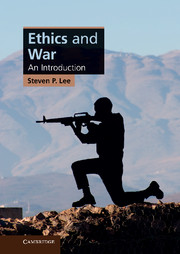Book contents
- Frontmatter
- Contents
- Figures and tables
- Preface
- 1 Understanding war in moral terms
- 2 The just war tradition: a brief history
- 3 When is it just to go to war?
- 4 Sovereignty and human rights
- 5 How should war be fought? Part one
- 6 How should war be fought? Part two
- 7 Civil wars
- 8 Justice at the end of war
- Bibliography
- Index
- References
4 - Sovereignty and human rights
Published online by Cambridge University Press: 05 June 2012
- Frontmatter
- Contents
- Figures and tables
- Preface
- 1 Understanding war in moral terms
- 2 The just war tradition: a brief history
- 3 When is it just to go to war?
- 4 Sovereignty and human rights
- 5 How should war be fought? Part one
- 6 How should war be fought? Part two
- 7 Civil wars
- 8 Justice at the end of war
- Bibliography
- Index
- References
Summary
War … is so horrible, that nothing but mere Necessity, or true Charity, can make it lawful.
Hugo GrotiusThe law of nations may be deduced, first, from the general principles of right and justice applied to the concerns of individuals, and thence to the relations and duties of nations.
Justice StoryIn the last chapter, we discussed jus ad bellum under the national defense paradigm, according to which only defensive war is justified. Given the priority principle, which is part of this idea of just cause, the first use of force is never justified. This understanding of just cause is different from that during much of the history of the just war tradition. In particular, the just war paradigm, which characterized the tradition through the seventeenth century, did not accept the priority principle, and aggression was not the only wrong that could justify war. In this chapter, we continue our discussion of jus ad bellum by examining whether there is a need to revise our account of just cause in ways more consonant with the just war paradigm.
In recent decades, a number of wars have been justified on humanitarian grounds. A humanitarian intervention is a war launched to rescue persons in another state suffering under a grave humanitarian crisis, such as genocide, mass enslavement, starvation, or ethnic cleansing, usually at the hands of their own government. Among the recent interventions widely viewed as justified on humanitarian grounds are India’s invasion of East Pakistan (1971), which established the state of Bangladesh, the Vietnamese invasion of Cambodia (1978), which ended the genocidal Khmer Rouge regime, the Tanzanian invasion of Uganda (1979), which overthrew the murderous regime of Ida Amin, the Somalia intervention by the United States and others (1992), which made possible the delivery of needed humanitarian relief, the United States invasion of Haiti (1994) to reestablish a democratically elected president, and the Kosovo War (1999), an attack on Serbia by the United States and several European states, seeking to end the ethnic cleansing by Serbia of ethnic Albanians in Kosovo.
- Type
- Chapter
- Information
- Ethics and WarAn Introduction, pp. 109 - 153Publisher: Cambridge University PressPrint publication year: 2011



